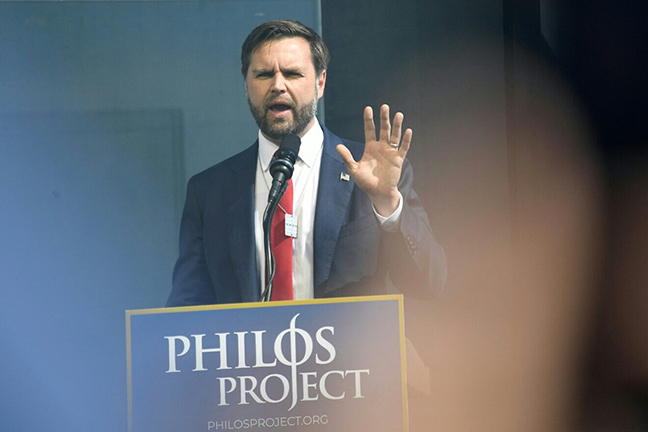Netanyahu ‘deeply saddened’ by death of Pat Robertson, ‘a great friend of Israel’

Televangelist Pat Robertson during his “Operation Blessing” visit to Victory Fellowship Church in Metairie, La., Feb. 12, 2006. Credit: Paparazzo Presents via Wikimedia Commons.
(JNS) — Israeli Prime Minister Benjamin Netanyahu and his wife, Sara, said they were “deeply saddened” to learn about the death of Pat Robertson. As the premier tweeted: “He was a great friend of Israel, second to none.”
Netanyahu added that he fondly remembers many meetings with Robertson, who died on June 8 at the age of 93, and “his warmth and steadfast friendship which stood the test of time and circumstance.”
“Over the decades, he led millions of his followers in supporting the Jewish state,” he wrote.
Nikki Haley, a Republican presidential candidate, tweeted that “Pat Robertson touched so many lives and changed so many hearts. He stood for America — and more importantly, for truth and faith. He did the Lord’s work and we will always remember his witness.”
Former U.S. Secretary of State Mike Pompeo tweeted that Robertson was “a giant of the faith,” and Franklin Graham, the son of American evangelist Billy Graham, wrote that Robertson “moved to a new address in Heaven.” Republican Gov. Glenn Youngkin of Virginia wrote that Robertson “was an inspiring Virginian and a passionate servant of the Lord, whose lifelong example leaves a legacy matched by very few.”
David Friedman, a former U.S. ambassador to Israel, tweeted that Robertson was “a brilliant orator and faith leader and an extraordinary friend of Israel and the Jewish People.” And AIPAC called Robertson “a great friend of Israel and a pioneer in the modern Christian Zionist movement.”
The International Fellowship of Christians and Jews also lauded the late religious leader, “whose decades of faithful support have helped us carry out our holy work, of helping God’s people, and of building bridges of faith and understanding between Christians and Jews.”
Writing on the website of the Christian Broadcasting Network, CBN — of which he is president and CEO, and which his father founded — Gordon Robertson called his father “an extraordinary man by any standard.”
“He was an evangelist, a humanitarian, an entrepreneur, an educator, an author, a statesman, a television personality, a man of global influence and tremendous vision,” he wrote. “Perhaps most important though, he was a dearly loved father, grandfather, great-grandfather and friend.”
One of the most visible Christian conservative faces
Marion Gordon “Pat” Robertson was born in Virginia. His father, Absalom Willis Robertson, served in both the U.S. Senate and the House from the early 1930s until the late 1960s. Pat earned a law degree at Yale University but opted not to become a lawyer.
Instead, Robertson started CBN in 1960. In 1966, he hosted “The 700 Club,” the channel’s flagship program, which he continued to helm for nearly 60 years. He also founded the Christian Coalition, Regent University and the American Center for Law and Justice, among other organizations.
With the late Rev. Jerry Falwell Sr., Robertson was one of the most visible faces of the Christian conservative movement, which began to emerge in the 1970s and came into prominence following its significant support of the election of Ronald Reagan as president.
Building on his visible role in media and politics, Robertson launched a bid for the Republican presidential nomination in 1988, helping to set a tone, strategy and style for other faith-based politicians who emerged in the next 35 years. He lost the nomination to then-Vice President George H. W. Bush.
Accusations of antisemitism over the years
Over the years, Robertson made many statements that have provoked controversy, many centered on Jews and Judaism.
“I first learned of Pat Robertson when he said, on Rosh Hashanah, that God doesn’t hear the prayers of Jews,” Shayna Weiss, associate director of Brandeis University’s Schusterman Center for Israel Studies, tweeted. “I was about 10 years old, and I heard my parents talking about it at synagogue after it was front-page news. It is one of my earliest memories of antisemitism and hate.”
In 1991, Robertson published The New World Order, which became a New York Times bestseller but drew accusations of antisemitism.
In a 2014 interview with Rabbi Daniel Lapin, Robertson said that Jews were “polishing diamonds, not fixing cars.” (Lapin agreed with Robertson that Jews are likelier to work in finance than car repair or lawn mowing.)
In response to a 1994 report from the Anti-Defamation League that he said made a broad case for Robertson being antisemitic, Norman Podhoretz penned a Commentary essay titled “In the Matter of Pat Robertson.”
The conclusion is “inescapable that Robertson, whether knowingly or unknowingly, has subscribed to and purveyed ideas that have an old and well-established antisemitic pedigree,” Podhoretz wrote. “Yet everyone, even Robertson’s most dogged prosecutors, recognizes that there is more to the story than that. For if Robertson is an antisemite, he is a most peculiar one.”
Having thoroughly documented the positive things that Robertson said and did for Jews and Israel, and examining the statements that purvey antisemitism, Podhoretz turned to the rabbinic concept of a contaminant becoming “neutralized” at a 1-to-60 ratio, batel b’shishim. “Robertson can and should be absolved on that basis of the charge of antisemitism,” he wrote.
In response to the Commentary article, Abraham Foxman, then national director of the ADL, wrote: “The ADL made no such case. We do not believe Robertson to be antisemitic and did not argue that he is.”
“One can air concerns about troubling statements and views without accusing their source of being an antisemite,” he added. “With regard to Pat Robertson, that is precisely what the ADL’s Religious Right report did — no more, no less.”



